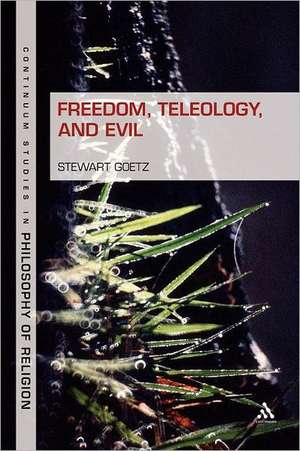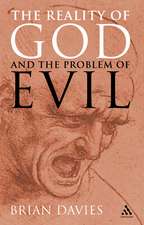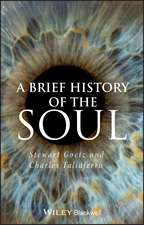Freedom, Teleology, and Evil: Continuum Studies in Philosophy of Religion
Autor Professor Stewart Goetzen Limba Engleză Paperback – 26 oct 2011
| Toate formatele și edițiile | Preț | Express |
|---|---|---|
| Paperback (1) | 256.67 lei 6-8 săpt. | |
| Bloomsbury Publishing – 26 oct 2011 | 256.67 lei 6-8 săpt. | |
| Hardback (1) | 889.88 lei 6-8 săpt. | |
| Bloomsbury Publishing – 20 noi 2008 | 889.88 lei 6-8 săpt. |
Preț: 256.67 lei
Nou
Puncte Express: 385
Preț estimativ în valută:
49.12€ • 51.09$ • 40.55£
49.12€ • 51.09$ • 40.55£
Carte tipărită la comandă
Livrare economică 14-28 aprilie
Preluare comenzi: 021 569.72.76
Specificații
ISBN-13: 9781441187697
ISBN-10: 1441187693
Pagini: 218
Dimensiuni: 156 x 234 x 12 mm
Greutate: 0.32 kg
Editura: Bloomsbury Publishing
Colecția Continuum
Seria Continuum Studies in Philosophy of Religion
Locul publicării:London, United Kingdom
ISBN-10: 1441187693
Pagini: 218
Dimensiuni: 156 x 234 x 12 mm
Greutate: 0.32 kg
Editura: Bloomsbury Publishing
Colecția Continuum
Seria Continuum Studies in Philosophy of Religion
Locul publicării:London, United Kingdom
Caracteristici
Virutally no-one has attempted to provide an in-depth defence of the noncausal view of libertarian freedom - this book will comprehensively fill that gap.
Notă biografică
Stewart Goetz is Ross Frederick Wicks Distinguished Professor in Philosophy and Religion at Ursinus College, PA, USA. He is co-author with Charles Taliaferro of Naturalism (Eerdmans, 2008) and A Brief History of the Soul (Blackwell, 2011). He serves on the board of directors for Blackwell's Philosophy Compass.
Cuprins
Chapter 1: Introduction Chapter 2: Noncausal Agency Chapter 3: Noncausal Agency and Its Critics Chapter 4: Noncausal Agency and Problems of Luck Chapter 5: The Principle of Alternative Possibilities Chapter 6: Self-forming Choices, Life Plans, and the Problem of Evil
Recenzii
This book provides not only a sustained presentation of one non-causal libertarian view, but also a detailed engagement with objections to it, and an excellent introduction to a substantial body of the current literature on the topic of free will. It makes a significant contribution to that literature and would make an excellent text for a graduate seminar.
In Freedom, Teleology, and Evil, Goetz provides a compelling defence of the position, demonstrating that it is worthy of deeper philosophical attention than it generally receives.
Stewart Goetz's Freedom, Teleology, and Evil is an impressive defense of a non-causal libertarian view of free will ... Goetz's book is a formidable challenge to these tendencies and worthy of attention by all those interested in free will.
Both familiarizes readers with currant philosophical debates and provides a defense of an original theory with which they can profitably engage ... a good choice for graduate seminars as well as scholars in the field.
Goetz's book Freedom, Teleology, and Evil is highly original and, indeed, unique in that it is a systematic defense of a non-causal approach to agency, including free will and moral responsibility. The critical arguments are probing, and Goetz's positive suggestions are provocative and important. I highly recommend this book.
Goetz's remarkable book Freedom, Teleology, and Evil fills a much-needed gap in the contemporary discussion of the metaphysics of human freedom ... His position is presented with great clarity and precision, and difficulties alleged to bedevil the theory are met head-on. The extension of the view into theological issues in the final chapter is also much to be applauded. Many libertarians (including this one) may still have reservations regarding the noncausal approach even after reading this impressive book, but few will (or at least should) still doubt that it is an option worthy of libertarians' most serious consideration.
Stewart Goetz skillfully develops a highly significant position on free will and moral responsibility ... This book will be valuable to anyone interested in the problem of free will, and especially to those attracted to exploring new possibilities for libertarian views of agency.
In Freedom, Teleology, and Evil, Goetz provides a compelling defence of the position, demonstrating that it is worthy of deeper philosophical attention than it generally receives.
Stewart Goetz's Freedom, Teleology, and Evil is an impressive defense of a non-causal libertarian view of free will ... Goetz's book is a formidable challenge to these tendencies and worthy of attention by all those interested in free will.
Both familiarizes readers with currant philosophical debates and provides a defense of an original theory with which they can profitably engage ... a good choice for graduate seminars as well as scholars in the field.
Goetz's book Freedom, Teleology, and Evil is highly original and, indeed, unique in that it is a systematic defense of a non-causal approach to agency, including free will and moral responsibility. The critical arguments are probing, and Goetz's positive suggestions are provocative and important. I highly recommend this book.
Goetz's remarkable book Freedom, Teleology, and Evil fills a much-needed gap in the contemporary discussion of the metaphysics of human freedom ... His position is presented with great clarity and precision, and difficulties alleged to bedevil the theory are met head-on. The extension of the view into theological issues in the final chapter is also much to be applauded. Many libertarians (including this one) may still have reservations regarding the noncausal approach even after reading this impressive book, but few will (or at least should) still doubt that it is an option worthy of libertarians' most serious consideration.
Stewart Goetz skillfully develops a highly significant position on free will and moral responsibility ... This book will be valuable to anyone interested in the problem of free will, and especially to those attracted to exploring new possibilities for libertarian views of agency.



















